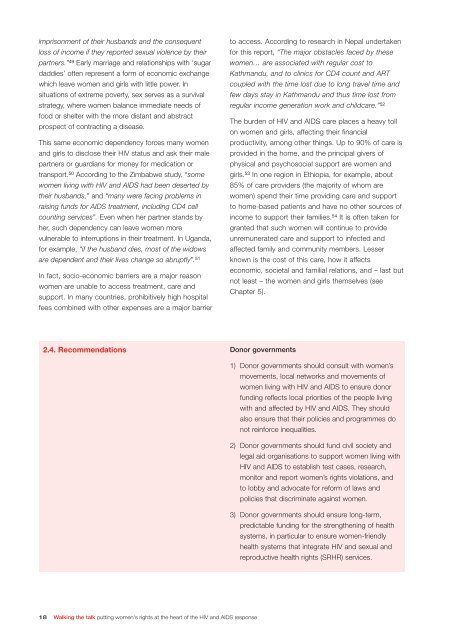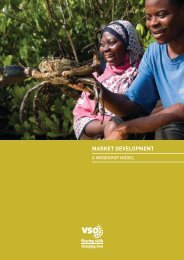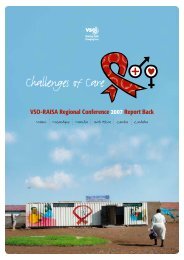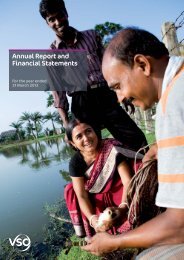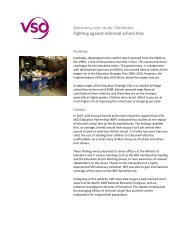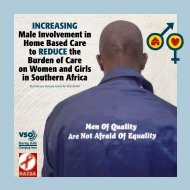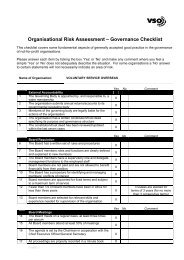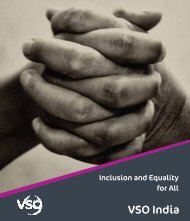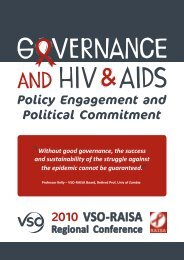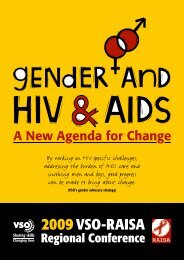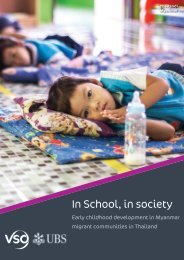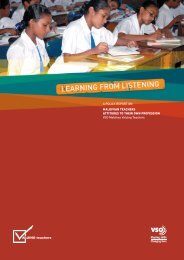Walking the Talk - VSO
Walking the Talk - VSO
Walking the Talk - VSO
You also want an ePaper? Increase the reach of your titles
YUMPU automatically turns print PDFs into web optimized ePapers that Google loves.
imprisonment of <strong>the</strong>ir husbands and <strong>the</strong> consequentloss of income if <strong>the</strong>y reported sexual violence by <strong>the</strong>irpartners.” 49 Early marriage and relationships with ‘sugardaddies’ often represent a form of economic exchangewhich leave women and girls with little power. Insituations of extreme poverty, sex serves as a survivalstrategy, where women balance immediate needs offood or shelter with <strong>the</strong> more distant and abstractprospect of contracting a disease.This same economic dependency forces many womenand girls to disclose <strong>the</strong>ir HIV status and ask <strong>the</strong>ir malepartners or guardians for money for medication ortransport. 50 According to <strong>the</strong> Zimbabwe study, “somewomen living with HIV and AIDS had been deserted by<strong>the</strong>ir husbands,” and “many were facing problems inraising funds for AIDS treatment, including CD4 cellcounting services”. Even when her partner stands byher, such dependency can leave women morevulnerable to interruptions in <strong>the</strong>ir treatment. In Uganda,for example, “if <strong>the</strong> husband dies, most of <strong>the</strong> widowsare dependent and <strong>the</strong>ir lives change so abruptly”. 51In fact, socio-economic barriers are a major reasonwomen are unable to access treatment, care andsupport. In many countries, prohibitively high hospitalfees combined with o<strong>the</strong>r expenses are a major barrierto access. According to research in Nepal undertakenfor this report, “The major obstacles faced by <strong>the</strong>sewomen… are associated with regular cost toKathmandu, and to clinics for CD4 count and ARTcoupled with <strong>the</strong> time lost due to long travel time andfew days stay in Kathmandu and thus time lost fromregular income generation work and childcare.” 52The burden of HIV and AIDS care places a heavy tollon women and girls, affecting <strong>the</strong>ir financialproductivity, among o<strong>the</strong>r things. Up to 90% of care isprovided in <strong>the</strong> home, and <strong>the</strong> principal givers ofphysical and psychosocial support are women andgirls. 53 In one region in Ethiopia, for example, about85% of care providers (<strong>the</strong> majority of whom arewomen) spend <strong>the</strong>ir time providing care and supportto home-based patients and have no o<strong>the</strong>r sources ofincome to support <strong>the</strong>ir families. 54 It is often taken forgranted that such women will continue to provideunremunerated care and support to infected andaffected family and community members. Lesserknown is <strong>the</strong> cost of this care, how it affectseconomic, societal and familial relations, and – last butnot least – <strong>the</strong> women and girls <strong>the</strong>mselves (seeChapter 5).2.4. Recommendations Donor governments1) Donor governments should consult with women’smovements, local networks and movements ofwomen living with HIV and AIDS to ensure donorfunding reflects local priorities of <strong>the</strong> people livingwith and affected by HIV and AIDS. They shouldalso ensure that <strong>the</strong>ir policies and programmes donot reinforce inequalities.2) Donor governments should fund civil society andlegal aid organisations to support women living withHIV and AIDS to establish test cases, research,monitor and report women’s rights violations, andto lobby and advocate for reform of laws andpolicies that discriminate against women.3) Donor governments should ensure long-term,predictable funding for <strong>the</strong> streng<strong>the</strong>ning of healthsystems, in particular to ensure women-friendlyhealth systems that integrate HIV and sexual andreproductive health rights (SRHR) services.18 <strong>Walking</strong> <strong>the</strong> talk putting women's rights at <strong>the</strong> heart of <strong>the</strong> HIV and AIDS response


